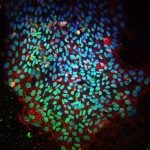Link to Pubmed [PMID] – 28498863
PLoS ONE 2017;12(5):e0177516
Myogenic stem cells are a promising avenue for the treatment of muscular disorders. Freshly isolated muscle stem cells have a remarkable engraftment ability in vivo, but their cell number is limited. Current conventional culture conditions do not allow muscle stem cells to expand in vitro with their bona fide engraftment efficiency, requiring the improvement of culture procedures for achieving successful cell-therapy for muscle disorders. Here we expanded mouse muscle stem cells and human myoblasts with Notch ligands, DLL1, DLL4, and JAG1 to activate Notch signaling in vitro and to investigate whether these cells could retain their engraftment efficiency. Notch signaling promotes the expansion of Pax7+MyoD- mouse muscle stem-like cells and inhibits differentiation even after passage in vitro. Treatment with Notch ligands induced the Notch target genes and generated PAX7+MYOD- stem-like cells from human myoblasts previously cultured on conventional culture plates. However, cells treated with Notch ligands exhibit a stem cell-like state in culture, yet their regenerative ability was less than that of freshly isolated cells in vivo and was comparable to that of the control. These unexpected findings suggest that artificial maintenance of Notch signaling alone is insufficient for improving regenerative capacity of mouse and human donor-muscle cells and suggest that combinatorial events are critical to achieve muscle stem cell and myoblast engraftment potential.

